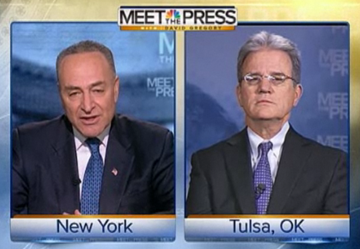 The Ticket
The TicketTop Republican, top Democrat to sit together at State of the Union

Those who support a bipartisan seating plan for members at the State of the Union address just received two big-name endorsers: Sens. Tom Coburn (R-Okla.) and Chuck Schumer (D-N.Y.).
Schumer announced Sunday on NBC's "Meet the Press" that he will be sitting with Coburn during the president's Jan. 25 speech.
"I called up Tom... he graciously agreed," Schumer, a well-known liberal lawmaker said of his staunch conservative colleague. "We're going to sit together... and we hope that many others will follow us."
Sen. Mark Udall (D-Colo.) is leading the charge within Congress to have members show a display of unity by sitting with members of the opposing party during the State of the Union. Traditionally, members sit with their own party, divided from the opposing party by the House aisle.
But in the wake of the Tucson, Ariz., shooting and discussions of heated political rhetoric, members say they believe this seating plan is one small way they can help set a new tone in politics.
"Violent discourse in political life, right, left, or center, is wrong and should be rejected," Schumer said Sunday. "But I do think we, as elected officials, have an obligation to try and tone that down."
Last Wednesday, Udall began circulating a letter asking for leadership to considering altering this year's seating plan. The letter continues to gain signatures. On Friday, Sen. Mark Begich (D-Alaska) joined his Republican colleague, Sen. Lisa Murkowski (Alaska), the lead Republican backing Udall's plan, in signing the proposal.
"I think Democrats and Republicans sitting together at the State of the Union is an excellent way to show we share a common goal of working to make this country a better place for every American," Begich said in a statement. "It may only be a symbolic gesture on one evening, but I believe it's a positive step toward showing unity and ending some of the partisan practices that have become common."

